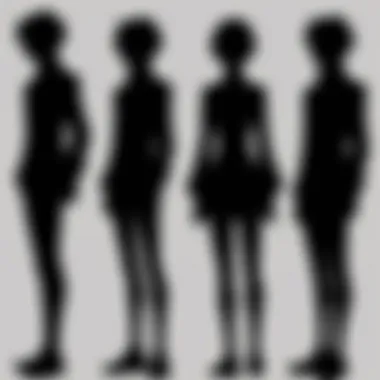Discover Your Anime Persona: Quiz Insights


Intro
In the expansive world of anime, characters are not just mere drawings; they are intricate reflections of human experiences, emotions, and identities. This article investigates a unique phenomenon prevalent within anime culture: quizzes that aim to align individuals with specific anime characters. These quizzes serve as both entertaining diversions and potential tools for self-reflection. By participating in such quizzes, fans delve deep into their psyche, exploring not only their favorite characters but also their own identities.
Understanding Character Alignment
Character alignment in anime often resonates with viewers on multiple levels. Each character embodies distinctive traits, motivations, and story arcs that can appeal to various aspects of human nature. In the contemporary cultural landscape, engaging with these characters through a quiz can lead to a more meaningful connection with anime. It opens a pathway to discover which traits we share with our favorite icons, enhancing our appreciation and understanding of narratives.
Character Analysis
Overview of Character Development
Character development in anime is a pivotal aspect that transforms flat personalities into dynamic figures. From protagonists like Naruto Uzumaki in Naruto to antagonists, such as Light Yagami from Death Note, each character undergoes substantial growth, responding to the world around them. This evolution can sometimes mirror the viewer's personal experiences, fostering a sense of connection.
Characters are often constructed around archetypes—hero, mentor, villain, or sidekick—which serve as touchstones for audiences. However, the layers of their personalities are what bring them to life. A quiz that identifies one’s anime persona may highlight these archetypes, allowing individuals to reflect on their own characteristics and journeys.
Key Relationships and Dynamics
Understanding a character’s relationships is essential in analyzing their development. For instance, the friendship between Goku and Vegeta in Dragon Ball Z evolves from rivalry to a profound bond, illustrating growth and mutual respect. Such dynamics can resonate deeply with quiz participants as they often reflect personal experiences with friends and rivals in their lives.
By examining these relationships, quizzes open dialogues about how individual traits can influence connections with others. The exploration of these ties makes the quiz results even more relevant, allowing fans to examine their own social interactions in relation to their favored characters.
Thematic Exploration
Central Themes and Messages
Anime frequently conveys universal themes such as love, sacrifice, friendship, and identity. These narratives can touch on complex psychological concepts, making them deeply relatable. A quiz that seeks to uncover a participant’s anime persona may delve into these themes, prompting individuals to consider how they align with core messages presented in different shows.
Through answering questions about personality traits, values, and priorities, participants can discover which themes resonate most with them, fostering a deeper understanding of themselves.
Cultural Context and Influences
The cultural influences surrounding anime cannot be overlooked. As a form of storytelling, anime is rich with social commentary. This context can enhance the results of a persona quiz by providing insights into broader societal trends and issues prevalent in today’s world. It allows participants to engage with both their personality traits and the cultural narratives that surround them.
"Anime provides a lens through which we can explore not only fictional worlds but also our own realities and identities."
In summary, the exploration of one’s anime persona through quizzes is not merely a playful distraction. It is an opportunity to engage with personal identity, reflect on character dynamics, and appreciate the thematic depth of anime. Both entertainment and insight are woven together in this interactive medium.
Preamble to Anime Character Quizzes
Anime character quizzes are an intriguing intersection of personality exploration and entertainment. These quizzes have grown significantly in popularity, providing not only light-hearted fun but also a form of self-discovery for many fans. Participants often seek to uncover which anime character they align with, revealing personal traits and preferences that might otherwise remain undiscovered.
The Rise of Personality Quizzes in Popular Culture
The boom of personality quizzes in popular culture can be traced back to social media's influence. Platforms like Facebook and Reddit enable users to share their results, creating a space for interaction and discussion. The appeal lies in their simplicity and the immediate gratification they provide. Data shows that more people engage with content that offers quick insights into their personality. An analysis of trends indicates that quizzes have become a staple in online culture, merging casual observation with deep personal reflection. This shift illustrates a broader societal desire for self-understanding.
Why Anime Characters Matter
Anime characters represent more than just fictional figures; they embody complex narratives, emotions, and philosophies. Characters like Goku from Dragon Ball Z or Sailor Moon from Sailor Moon have become cultural icons. Many fans connect with these characters on a personal level, often seeing their struggles and journeys as reflections of their own. Consequently, understanding one's anime persona can provide valuable insights into personal identity and values.
"Character identification offers a glimpse into our psyche, allowing us to understand our motivations and aspirations."


In addition, these characters serve as a reflection of societal values and cultural nuances. Engaging with quizzes that align participants with these characters can deepen their connection to the narrative and enhance their appreciation of the anime genre. By exploring which characters resonate with them, individuals gain clarity about their own traits, preferences, and emotional responses, thereby enriching their anime experience.
Understanding Character Archetypes
In the world of anime, character archetypes play a vital role in storytelling and audience engagement. They serve as foundational templates that create familiarity and relatability for viewers. By understanding these archetypes, audiences can better connect with the characters depicted in their favorite series, enhancing their overall experience. Exploring character archetypes reveals not just who we might relate to but also why these connections feel significant. Unraveling such identities is crucial for quizzes that aim to uncover your anime persona.
The exploration of archetypes allows individuals to reflect on personal traits and preferences, aligning their own qualities with those of the characters they admire. This synthesis is beneficial for self-discovery and can spark insightful discussions within the anime community. Let’s delve deeper into the archetypes commonly found in anime and their influence on audience connections.
Common Archetypes in Anime
Character archetypes in anime often encompass a range of specific roles, each with distinct traits and narratives. Here are some of the prominent archetypes:
- The Hero: Often the central character, knowledgeable and brave, embarking on quests or defending their values. Examples include Shinji Ikari from "Neon Genesis Evangelion" or Natsu Dragneel from "Fairy Tail."
- The Anti-Hero: These characters embody complexity and moral ambiguity. They break traditional heroic norms. Examples are Light Yagami from "Death Note" or Guts from "Berserk."
- The Sidekick: Loyal and supportive, sidekicks assist heroes, adding depth to their journeys. Characters like Shikamaru Nara from "Naruto" exemplify this role well.
- The Mentor: Typically wise and experienced, mentors guide younger characters through challenges. Jiraiya from "Naruto" serves as a quintessential mentor figure.
- The Love Interest: A character who often drives the protagonist's motivations, highlighting emotional stakes. Examples include Hinata Hyuga from "Naruto" or Rem from "Re:Zero."
- The Comic Relief: Lightens moments of tension, keeping the audience engaged. A character like Kon from "Bleach" showcases this role.
Understanding these archetypes allows audiences to find their resonance within them, fostering a greater understanding of their own personas in relation to favorite characters.
How Archetypes Influence Audience Connection
The archetypes present in anime create a framework through which viewers can identify with characters on multiple levels. These connections can stem from shared values, past experiences, or emotional struggles. Here’s how:
- Emotional Engagement: When viewers see their traits mirrored in a character, it fosters emotional responses. This connection can evoke feelings of empathy and investment in the character's journey.
- Cultural Reflection: Anime often reflects societal norms and values through its characters. By engaging with these archetypes, viewers can gain insights into their own cultural contexts.
- Personal Growth: Identifying with a character's growth or challenges can encourage viewers to reflect on their life decisions, fostering personal development.
- Community Discussion: Archetypes create common ground among fans, allowing for rich dialogue and debate about character motivations and story arcs.
Understanding character archetypes can unlock deeper insights into storytelling and personal identity.
The Structure of Anime Personality Quizzes
The structure of anime personality quizzes is a crucial aspect of understanding how these engaging tools function and resonate with their audience. Well-structured quizzes can reveal personal insights and provide entertainment while connecting users to the beloved characters from their favorite shows. A quiz that is designed thoughtfully can elevate the experience for each participant, making them feel a genuine connection to the outcome.
When considering quiz structure, several key elements come into play. These include clarity in the direction provided to users, a balance between engagement and educational content, and the depth of the questions that lead to discerning matches with characters.
Benefits of a Well-Designed Quiz:
- User Engagement: A clear structure helps maintain participant interest. Engaging formats, such as visuals or interactive elements, help keep respondents involved.
- Accurate Results: A logical flow of questions tailored to elicit specific traits can lead to a more accurate personality match with characters.
- Self-Discovery: A well-structured quiz encourages individuals to reflect on their preferences and traits, offering them a new perspective on their own personality.
In summary, the structure of an anime personality quiz can significantly influence the experience. It is essential to consider user engagement, clarity, and the connection to the characters to create an enriching and meaningful activity.
Quiz Design Best Practices
The design of a quiz is pivotal in ensuring that it meets the expectations of the audience while delivering meaningful insights. First, quiz designers must establish clear objectives that define what the quiz aims to achieve. Knowing the target demographic is vital. For anime enthusiasts, understanding their interests in specific genres or character traits can help tailor questions more effectively.
Best practices include:
- Simplicity and Clarity: Questions should be straightforward. Users should not overthink the answers. The goal is to elicit spontaneous reactions or thoughts about their identity.
- Balanced Answer Options: Provide a well-rounded set of answer choices, avoiding extremes. This ensures that participants do not feel boxed in and can select responses that genuinely reflect their personalities.
- Visual Appeal: Integrating visuals from anime enhances the attractiveness of the quiz and keeps users interested throughout the process. This can include character art, relevant images, or thematic backgrounds.
"A well-crafted quiz design can simplify complex ideas about personality and make them accessible to a broader audience."
Implementing these best practices can enhance the participant experience, making them feel valued and engaged.
Types of Questions Employed
The types of questions used in anime personality quizzes are diverse and strategically chosen to reveal various aspects of a participant's character. Primarily, these questions fall into two categories: direct and situational.
- Direct Questions: These inquiries target specific personal traits or preferences, such as favorite activities or decisions in hypothetical situations. An example might be, "Which of these hobbies would you prefer?" Choices might range from reading manga to playing video games.
- Situational Questions: These questions present scenarios that challenge the participant to think critically about their responses. For instance, "How would you react if a friend needed support during a tough time?" This type offers deeper insights into the individual's character and problem-solving approaches.


Creating a mix of these question types can optimize the quiz's ability to provide accurate and meaningful results. Moreover, it encourages self-reflection, allowing participants to assess their values and preferences in relation to their favorite anime characters.
Psychological Aspects of Character Identification
Understanding the psychological aspects of character identification is crucial in the realm of anime personality quizzes. These quizzes provide not only entertainment, but they also offer deeper insights into the motivations and emotions of individuals. Engaging with fictional characters allows people to explore their identities in a unique and often safe environment. This can lead to better self-awareness and clarity about one's own personality traits and desires.
The Impact of Self-Perception
Self-perception plays a significant role in how individuals relate to anime characters. When someone takes a quiz, they often reflect their own beliefs and feelings through the lens of these fictional personas. It can be revealing to see which traits resonate most. For example, identifying with a character who is known for bravery may encourage the participant to recognize similar qualities in themselves. Conversely, if a quiz leads one to a more timid character, it might provoke thoughts about personal growth and areas of self-improvement.
"Character identification isn’t just about entertainment; it’s a tool for introspection and exploration of personal values."
This connection emphasizes the potential growth individuals can experience through such quizzes. It raises questions about how people view their strengths and weaknesses, promoting a more profound understanding of one's personal narrative.
Using Quizzes for Self-Reflection
Quizzes serve as a practical mechanism for self-reflection. They foster an environment where participants can contemplate their reactions, aspirations, and emotional states. Unlike traditional methods of self-discovery, such as therapy or journaling, these quizzes can offer immediate feedback in the form of character alignment. This instant connection can be both gratifying and thought-provoking.
Participants might find themselves evaluating why they align with a character's traits, exploring motivations behind their choices, and assessing the implications for their lives. This style of analysis can be very enlightening. Self-reflection may also lead to discussions within communities where shared experiences are highlighted. Thus, quizzes become not only a personal exploration tool but also a way to connect with others who share similar traits or experiences, enhancing both individual and communal understanding.
The Role of Community in Anime Quizzes
The community plays a crucial role in the experience of anime quizzes. These quizzes are not just instruments for self-discovery, but also a means of connecting people who share similar interests. Engaging with a wider audience can enhance the enjoyment of the quiz and its outcomes. In this environment, individuals can both share their results and engage in deeper discussions about their favorite characters. This social aspect adds a layer of depth to the quizzes that is often overlooked.
When individuals take these quizzes, they often feel a sense of belonging. This shared journey of character exploration fosters discussions. Participants may dive into topics like character motivations, stories, and the personal significance of results. It creates a communal atmosphere where fans can express opinions and discover new perspectives throughout the process.
Shared Experiences and Discussions
The essence of shared experiences in a community is significant. Users not only take the quiz as an individual but also collectively relate their outcomes. After completing a quiz, it is common to share results across platforms like Reddit or Facebook. These sharing moments can spark lively discussions surrounding the quiz’s accuracy or the relevance of characterized traits.
Discussions may evolve around:
- Specific anime series that relate to quiz outcomes.
- The evolution of character development in stories.
- Personal anecdotes linked to those characters.
Such communicative exchanges allow one to reflect on their quiz results deeper. The act of discussing leads to understanding one's anime persona more thoroughly and encourages exploration of new anime genres and characters.
Creating Bonds Through Shared Character Identities
Character identity in the quiz context extends the concept of connection. Individuals often find themselves aligned with a character’s personality, values, or even appearance. This association can serve as a foundation for friendships. Through online discussions or social media interactions, fans create bonds based on shared traits or resonating attributes.
When fans relate to the same character, it cultivates a sense of camaraderie. They find common ground, which can lead to:
- Establishing friendships with others who share similar characters.
- Participating in fandom activities such as fan art creation or cosplay.
- Joining online forums dedicated to those specific anime or character traits.
The shared connection through character identification can foster a welcoming environment for fans, regardless of experience level. This reinforcement builds community strength, making anime quizzes a pivotal element in fostering social interaction among enthusiasts.
Collective engagement through these quizzes promotes not only personal insights but also enriches community dynamics, making every result uniquely significant.
Examples of Popular Anime Character Quizzes
Anime character quizzes have gained traction in recent years, becoming a staple in online fandom experiences. These quizzes not only entertain but also provide insight into one's personality through the lens of beloved anime characters. Analyzing these popular quizzes helps us understand their appeal and significance within the community of anime enthusiasts.
Analysis of Leading Quizzes Available Online


Numerous platforms host anime character quizzes, each offering unique formats, styles, and themes. Websites like BuzzFeed, PlayBuzz, and Quotev often lead the pack. The quizzes can range from simple questions about your preferences to intricate story-based journeys that require deeper thought.
For instance, quizzes on BuzzFeed might ask about food choices or personal values, then match users to characters like Monkey D. Luffy from "One Piece" or Rem from "Re:Zero". Alternatively, a quiz on Quotev can include situational questions that require the user to choose actions in a hypothetical scenario. This added layer enhances engagement and offers more nuanced results.
The variety of quizzes can cater to different aspects of personality. Some quizzes focus on traits like bravery or loyalty, aligning users with characters such as Naruto or Mikasa from "Attack on Titan". Others delve into more comedic territory, presenting quirky options and assigning characters based on humor preferences. This flexibility is a key factor in their widespread usage and enjoyment.
Feedback and Reception from Users
The feedback surrounding anime character quizzes is worth noting. Many users express satisfaction with the accuracy of the results, often sharing them on social media platforms like Facebook and Reddit. This shareability amplifies their visibility and invites others to participate, further contributing to the community aspect.
However, not all feedback is positive. Some users critique quizzes for being overly simplistic or not truly reflective of their personalities. These critiques often highlight the potential for bias in question phrasing or options, which can lead to skewed results.
In response to this, many quiz creators strive to refine their methodologies. They often collect user feedback to enhance the quiz design and improve the user experience. This interaction fosters a sense of collaboration within the community, where users can influence the development of future quizzes.
In summary, analyzing popular anime character quizzes offers insights into not only the quizzes themselves but also the broader community. The responses range from joyful revelations to constructive criticism, all of which contribute to the ongoing evolution of these beloved online activities.
Cultural Implications of Anime Character Identification
Understanding the cultural implications of anime character identification fosters a deeper appreciation of both the medium and its audience. This phenomenon goes beyond mere entertainment, reflecting social dynamics, personal identity, and intercultural exchanges. Anime engages a global audience who often find resonance in characters that embody a wide range of human experiences. Through popular quizzes that match individuals with specific anime personas, enthusiasts can explore and affirm their own identities while gaining insights into cultural contexts.
The cross-cultural appeal of anime character identification allows diverse audiences to relate to narratives and themes that may originate from Japanese culture but are adaptable for global consumption. By examining these connections, individuals can better understand how cultural references and character roles are perceived across different societies. This knowledge can enrich the viewer's overall experience and enhance appreciation for the storytelling methods employed in anime.
Understanding Japanese Culture Through Character Roles
Japanese culture is rich and complex, and its influences are intricately threaded into the portrayal of characters within anime. Each character often reflects societal values, historical contexts, or philosophical concepts prevalent within Japan. For instance, the concept of wa (harmony) can be seen in characters who prioritize community over self. These representations provide viewers with a glimpse into cultural nuances that may not be visible at first glance.
Moreover, character roles often encapsulate traditional values juxtaposed against modern societal challenges. Examples such as the determined hero or the nurturing caregiver showcase how these archetypes embody qualities deeply appreciated in Japanese society. Anime, therefore, becomes a medium for cultural exchange, inviting audiences to explore and engage with these values.
Globalization and Its Effects on Character Popularity
Globalization has introduced anime to a diverse array of viewers, expanding character popularity across different cultures. With the rise of digital platforms, anime is accessible to audiences far beyond Japan. This accessibility leads to a greater exchange of ideas and themes, where characters become symbols of shared experiences between cultures.
As characters from various genres gain fame outside of Japan, their portrayal often undergoes transformation. Local audiences may reinterpret their traits to align with their values or societal norms, thereby altering their reception and meaning. For example, certain characters may evoke themes of resistance in one culture and camaraderie in another, demonstrating the fluid nature of character identity.
The End: The Significance of Anime Character Quizzes
Anime character quizzes hold a unique position in both fandom and popular culture. They serve as engaging tools that allow individuals to reflect on their personal traits through the lens of their favorite characters. This connection cultivates a deeper understanding of individuals’ own identities, showcasing how fictional personas can impact real-life self-perception. Amidst a myriad of available quizzes, each designed with various methodologies, the underlying psychological implications can enhance personal exploration.
Important aspects of these quizzes include:
- Self-Discovery: Taking these quizzes allows participants to explore and analyze their own qualities, desires, and fears through character parallels.
- Community Building: Responding to quizzes encourages sharing results within social networks, sparking discussions that build relationships among fans.
- Cultural Insights: The results can reveal how cultural nuances influence identity perceptions, both in Japan and abroad.
"Anime character quizzes are more than just fun; they are tools for introspection and cultural engagement."
The significance of these character quizzes extends beyond entertainment. They enable individuals to find comfort in shared experiences and foster a sense of belonging in a vast community of fans.
Summarizing Key Insights
The exploration of anime character quizzes reveals several key insights. First, the quizzes tap into the universal desire for self-understanding, which resonates across various demographics. Second, the connection between character archetypes and personal traits highlights how deeply these narratives impact our lives. Third, the role of online communities in promoting sharing and discussion of quiz results emphasizes community as a powerful force in the anime fandom.
Whether for leisure or personal exploration, these quizzes appeal to a diverse audience. The simple act of identifying with a character can lead to profound self-reflection and interaction within a broader community.
Future Trends in Anime Character Quizzes
As the digital landscape evolves, a few trends are likely to shape the future of anime character quizzes. Technological advancements will continue to enhance the interactivity of quizzes. Features like AI integration may provide more personalized experiences, tailoring results to user behavior and preferences.
Another anticipated trend is the blending of quizzes with storytelling. Platforms could combine character identification with interactive narratives, allowing participants to journey through scenarios that reflect their quiz outcomes. This fusion of gameplay and self-discovery can attract broader audiences.
Moreover, the influence of global anime culture will drive the diversification of character quizzes. As anime continues to gain traction internationally, fans from various backgrounds will seek quizzes that better reflect their cultural context.















